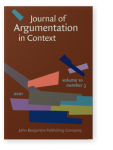Vol. 10:3 (2021) ► pp.397–417
The co-construction of campaign argumentation on U.S.A. late-night talk shows
This study shows that when presidential candidates visit, late-night talk show discourse is argumentative, and that this argumentation is co-constructed by the host and the candidate. Through their questions, hosts implicitly invoke arguments by casting doubt on the candidate’s presidential bid. By treating the host’s questions as critical questions expressing skepticism whether people should vote for the candidate, politicians prototypically use two types of argument schemes to defend their case. First, to argue that their policy proposals are needed, candidates use complex problem-solving argumentation. Second, to maintain that they have the skills and character to succeed as president, candidates use symptomatic argumentation. In their response, candidates also deal with other critical questions belonging to the argument scheme invoked through the host’s question. Which critical questions of that argument scheme the candidate addresses in addition to the one posed by the host depends on the type of question the host has asked.
Article outline
- 1.Introduction
- 2.Politicians’ campaign appearances on late-night talk shows
- 3.Conceptual framework, data and methodology
- 4.Question-answer sequences about policy
- 5.Question-answer sequences about presidential qualities
- 6.Conclusion
- Acknowledgements
- Notes
-
References
